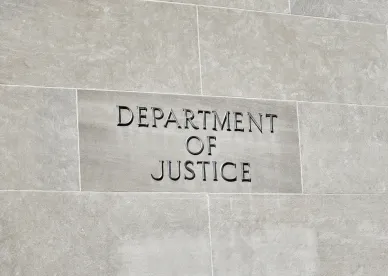The U.S. Department of Justice (DOJ) issued policy guidance on May 6, 2019, about providing credit in False Claims Act (FCA) settlements to corporations for “disclosure, cooperation, and remediation." DOJ has never previously issued guidance regarding credit in FCA matters. This guidance, coupled with the passage of the Tax Cuts and Jobs Act in 2017 (which requires DOJ to specify the amount of “restitution” or “remediation” at the time of settlement), provides meaningful specificity as to what conduct constitutes disclosure, cooperation, and remediation, as well as data for evaluating whether credit is actually reflected in negotiated FCA settlements. This policy guidance is part of the Justice Manual, Section 4-4.112.
Amount of Credit
DOJ states that the credit will be reflected in the form of reduced “penalties or damages multiple sought.” Further, DOJ provides that the application of credit cannot result in payment of less than the sum of federal damages, interest on that loss amount, investigative costs, and the relator’s share, if applicable. Beyond that, DOJ does not specify any concrete guidelines for the quantitative reduction in “damages multiple sought” and thus retains discretion, on a case-by-case basis, about the financial value of any credit.
Conduct that Merits Credit
Under the new policy, the activities that will result in a credit include voluntary self-disclosure, cooperation, and remediation.
Voluntary self-disclosure is described as “[p]roactive, timely, and voluntary self-disclosure” of the violation before DOJ becomes aware of the harm. Moreover, if a corporation conducts an internal investigation of concerns identified by the government and finds "additional misconduct" during the investigation that is outside the scope of the known concerns, voluntary self-disclosure of the newly discovered conduct will also result in credit.
DOJ sets out factors that may constitute cooperation during an ongoing investigation. DOJ’s guidance includes a non-exhaustive list of conduct, each of which could result in credit for cooperation:
-
Identifying individuals substantially involved in or responsible for the misconduct;
-
Disclosing relevant facts and identifying opportunities for the government to obtain evidence relevant to the government’s investigation that is not in the possession of the entity or individual or not otherwise known to the government;
-
Preserving, collecting, and disclosing relevant documents and information relating to their provenance beyond existing business practices or legal requirements;
-
Identifying individuals who are aware of relevant information or conduct, including an entity’s operations, policies, and procedures;
-
Making available for meetings, interviews, examinations, or depositions an entity’s officers and employees who possess relevant information;
-
Disclosing facts relevant to the government’s investigation gathered during the entity’s independent investigation (not to include information subject to attorney-client privilege or work product protection), including attribution of facts to specific sources rather than a general narrative of facts, and providing timely updates on the organization’s internal investigation into the government’s concerns, including rolling disclosures of relevant information;
-
Providing facts relevant to potential misconduct by third-party individuals and entities;
-
Providing information in native format, and facilitating review and evaluation of that information if it requires special or proprietary technologies so that the information can be evaluated;
-
Admitting liability or accepting responsibility for the wrongdoing or relevant conduct; and
-
Assisting in the determination or recovery of the losses caused by the organization’s misconduct.
Finally, remediation in response to the violation can be established in various ways, including:
-
Demonstrating a thorough analysis of the cause of the underlying conduct and, where appropriate, remediation to address the root cause;
-
Implementing or improving an effective compliance program designed to ensure the misconduct or similar problem does not occur again;
-
Appropriately disciplining or replacing individuals identified by the entity as responsible for the misconduct either through direct participation or failure in oversight, as well as those with supervisory authority over the area where the misconduct occurred; and
-
Any additional steps demonstrating recognition of the seriousness of the entity’s misconduct, acceptance of responsibility for it, and the implementation of measures to reduce the risk of repetition of such misconduct, including measures to identify future risks.
Notably, the new policy guidance reflects DOJ’s current informal practice of mitigating liability if a company had an existing compliance program in place before the violation occurred. The guidance states that the “nature and effectiveness of such a compliance program” could factor into DOJ’s assessment of “whether any violation of law was committed knowingly,” which is an element of a FCA violation.
We will monitor closely how this policy is implemented by DOJ and the U.S. Attorneys’ Offices.





 />i
/>i
